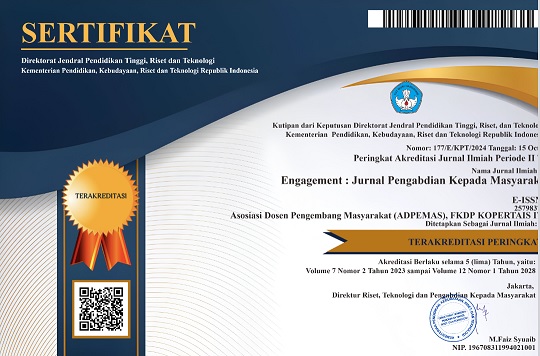Economic Empowerment of Housewives Based on OPOR (One Product in One RT) in Pojok Village of Magetan Regency, Using the Asset-Based Community-Driven Development (ABCD) Approach
Abstract
Nowadays, the improvement in resources, especially among women, is considered. One of the efforts to empower women in the village can be done through the assistance of Micro, Small, and Medium Enterprises (MSMEs). This research-based community service aims to assist the community, especially women (housewives) in Pojok Village of Magetan Regency, in developing home businesses. This community service is carried out by using ABCD approach, which is an approach to understanding and internalizing assets, potential, strength, and utilization independently and optimally. The results of the community service carried out by researchers have positive impact to the community and it fosters a high desire and enthusiasm to make changes for the better in the development of marketing businesses, both during the mentoring process and post-mentoring so that the economy in Pojok Village, Magetan Regency can increase
Downloads
References
Adriana, Venny, Mariana Amiruddin, MB Wijaksana, Eko Bambang Subiyantoro, Sofia Kartika, and Lita Purnama. Mengurai Kemiskinan, Dimana Perempuan? 42nd ed. Jurnal Perempuan, 2005.
Andyarini, Esti Novi, Sarita Oktorina, and Hamim Rosidi. “Strengthening Self Capacity of Ex-Localization of Prostitution Community at Bangunsari Surabaya for Economic Independence through Asset Based Community-Driven Development (ABCD) Approach.” Jurnal Pengabdian kepada Masyarakat 04 (2020): 278–297.
Baaco, Malou C, Rosario Cabuhat Alzona, and Emely Dulig Dicolen. “Organization Development Interventions of Asilo de San Vicente de Paul, 2015-2018: A Developmental Study.” International Journal of Humanities and Social Sciences 12, no. 3 (June 30, 2020): 13–41.
Bertram, Rachael, Diane Culver, and Wade Gilbert. “Using Appreciative Inquiry to Create High- Impact Coach Learning: Insights From a Decade of Applied Research.” AI Practitioner (May 1, 2016): 59–65.
Clouder, Lynn, and Virginia King. “What Works? A Critique of Appreciative Inquiry as a Research Method/Ology.” 169–190, 2015.
Fundin, Anders, Johan Lilja, Yvonne Lagrosen, and Bjarne Bergquist. “Quality 2030: Quality Management for the Future.” Total Quality Management and Business Excellence (2020).
Harrison, Rebecca, Christian Blickem, Jonathan Lamb, Susan Kirk, and Ivaylo Vassilev. “Asset-Based Community Development: Narratives, Practice, and Conditions of Possibility—A Qualitative Study With Community Practitioners.” SAGE Open 9, no. 1 (January 1, 2019).
Hermanu. “Studi Implementasi Izin Edar Produk Pangan Industri Rumah Tangga (Pirt) Dalam Mewujudkan Keamanan Pangan Yang Optimal Di Kota Semarang.” Hukum dan Dinamika Masyarakat 11, no. 2 (2014): 149–162.
Japhta, Rubin, Prashant Murthy, Yopie Fahmi, Anastassiya Marina, and Aarti Gupta. “UKM Yang Dimiliki Wanita Di Indonesia: Kesempatan Emas Untuk Institusi Keuangan Lokal.” International Finance Corporation (2016): 32–44.
Kartika, Norma Yuni. Peran Wanita Dalam Menghadapi Bonus Demografi. Vol. 19, 2018.
Kemen PPPA. “WUJUDKAN PEMBERDAYAAN PERKONOMIAN PEREMPUAN DALAM UMKM BERBASIS GENDER.” Siaran Pers Nomor: B-127/SETMEN/HM.02.04/04/2021. Last modified 2021. https://www.kemenpppa.go.id/index.php/page/read/29/3162/wujudkan-pemberdayaan-perkonomian-perempuan-dalam-umkm-berbasis-gender.
Kotler, Philiph. Management Pemasaran. Mileinium. Jakarta: PT Indeks Kelompok Gramedia, 2016.
———. Marketing Management. Soldering & Surface Mount Technology. 15th ed. Vol. 13. Amerika: Pearson, 2001.
———. Principles of Marketing. 14th ed. Essex: Pearson, 2012.
Kumalasari, Mei Lina Fitri, Abdul Muhid, and Funsu Andiarna. “Community Mentoring Through Efforts to Use The Waste of Cow Dung Into Biogas and Organic Fertilizer Towards Energy Independent Society.” Engagement: Jurnal Pengabdian Kepada Masyarakat 4, no. 1 (2020): 1–13.
Kusumawardhani, Dhian, Amy Y. Rahayu, and Irfan Ridwan Maksum. “The Role of Government in MSMEs:The Empowerment of MSMEs during the Free Trade Era in Indonesia.” Australasian Accounting, Business and Finance Journal 9, no. 2 (July 2, 2015): 23–42.
Marina R, Klimchuk; Sandra A Krasovec. Desain Kemasan: Perencanaan Merek Produk Yang Berhaisl Mulai Dari Konsep Sampai Penjualan. Jakarta: Erlangga, 2007.
Mokhtar, Noor Fadhiha, Zuha Rosufila Abu Hasan, and Mohammad Abi Sofian Abdul Halim. “Applying Technology Organization And Environment (TOE) Model in Social Media Marketing Adoption: The Case of Small And Medium Enterprises in Kelantan, Malaysia.” Social Sciences (Pakistan) 11, no. 21 (2016): 5139–5144.
Nastain, Muhammad. “Branding Dan Eksistensi Produk (Kajian Teoritik Konsep Branding Dan Tantangan Eksistensi Produk).” CHANNEL: Jurnal Komunikasi 5, no. 1 (2017): 14–26.
Nel, Hanna. “An Integration of the Livelihoods and Asset-Based Community Development Approaches: A South African Case Study.” Development Southern Africa 32, no. 4 (July 4, 2015): 511–525.
Putra, Nino Eka. “Dewa Wisana: Pemberdayaan Perempuan Dalam Peningkatan Ekonomi Bangsa Melalui UMKM.” Humas FEB UI. Last modified 2021. https://www.feb.ui.ac.id/blog/2021/05/01/dewa-wisana-pemberdayaan-perempuan-dalam-peningkatan-ekonomi-bangsa-melalui-umkm/.
Ramadani, Veland, Robert D. Hisrich, Grisna Anggadwita, and Dini Turipanam Alamanda. “Gender and Succession Planning: Opportunities for Females to Lead Indonesian Family Businesses.” International Journal of Gender and Entrepreneurship 9, no. 3 (2017): 229–251.
Sebidi, Kgaugelo, and Frank Vollmer. Global Multidimensional Poverty Index 2018: The Most Detailed Picture To Date of the World’s Poorest People, 2018. https://www.researchgate.net/publication/330421754.
Silayoi. “The Importance of Packaging Attributes: A Conjoint Analysis Approach.” Europian Journal of Marketing 41, no. 12 (2007): 1495–1517.
Suwana, Fiona, and Lily. “Empowering Indonesian Women through Building Digital Media Literacy.” Kasetsart Journal of Social Sciences 38, no. 3 (September 1, 2017): 212–217.
Taufiq, Amal, and Siti Asiah. “Pencegahan Covid-19 Pada Komunitas.” Jurnal Abdimas Bela Negara 1, no. 2 (2020): 39–50.
Teguh Prasetyo, Ery, Leny Muniroh, Hamid Halin, and Widi Winarso. The Activities of SMEs and The Role Indonesian Government During Covid-19 Pandemic, n.d. www.solidstatetechnology.us.
Trajkovski, Suza, Virginia Schmied, Margaret Vickers, and Debra Jackson. “Implementing the 4D Cycle of Appreciative Inquiry in Health Care: A Methodological Review.” Journal of Advanced Nursing, June 2013.
World Economic Forum. Global Gender Gap Report 2021, 2021. http://reports.weforum.org/global-.
Wu, Mao Ying, and Philip L. Pearce. “Asset-Based Community Development as Applied to Tourism in Tibet.” Tourism Geographies 16, no. 3 (2014): 438–456.
Copyright (c) 2022 Engagement: Jurnal Pengabdian Kepada Masyarakat

This work is licensed under a Creative Commons Attribution-ShareAlike 4.0 International License.






.png)




